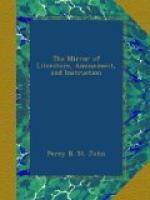In France, those who had been bankrupts were obliged ever after to wear a green cap, to prevent people from being imposed on in any future commerce. By several arrets, in 1584, 1622, 1628, and 1688, it was decreed, that if they were at any time found without their green cap, their protection should be null, and their creditors empowered to cast them into prison; but this practice is not now continued.
Among the formation of the different domestic trades of the metropolis into fraternities, or companies, were the Capellarii, or Cappers. Respecting these, Hugh Fitz-Otonis, the city custos, in the 54th of Henry III., made certain ordinances, in the presence of the aldermen, as that none “should make a cap but of good white or grey wool, or black; that none dye a cap made of white or grey wool into black, they being apt, so dyed, to lose their colour through the rain,” &c.
P.T.W.
* * * * *
WRESTLING.
At Hornchurch, in Essex, there is a singular custom on Christmas Day of wrestling for a boar’s head, which is provided by the occupier of Hornchurch Hall. This custom is said to have originated in some charter, with which a correspondent, (H.B.A.,) is totally unacquainted.
* * * * *
PERSECUTION OF THE JEWS
Mr. Turner has collected (Hist. Eng.) many curious facts relative to the condition of the Jews, especially in England. Others may be found dispersed in Velly’s History of France; and many in the Spanish writers, Mariana and Zurita. The following are from Vaissette’s History of Languedoc:—It was the custom at Toulouse to give a blow on the face to a Jew every Easter;—this was commuted, in the twelfth century, for a tribute. At Beziers another usage prevailed—that of attacking the Jews’ houses with stones, from Palm Sunday to Easter. No other weapon was to be used; but it generally produced bloodshed. The populace were regularly instigated to the assault by a sermon from the bishop. At length, a prelate, wiser than the rest, abolished this ancient practice, but not without receiving a good sum from the Jews.
* * * * *
THE GATHERER.
* * * * *
Crusades.—Mr. Hallam, in his excellent History of the Middle Ages, (vol. iii. p. 359), gives the following view of these misconceived glories of history:—“The crusades may be considered as martial pilgrimages on an enormous scale; and their influence upon general morality seems to have been altogether pernicious. Those who served under the cross would not indeed have lived very virtuously at home; but the confidence in their own merits, which the principle of such expeditions inspired, must have aggravated the ferocity and dissoluteness of their ancient habits. Several historians attest the depravation of morals which existed both among the crusaders, and in the states formed out of their conquests.”




